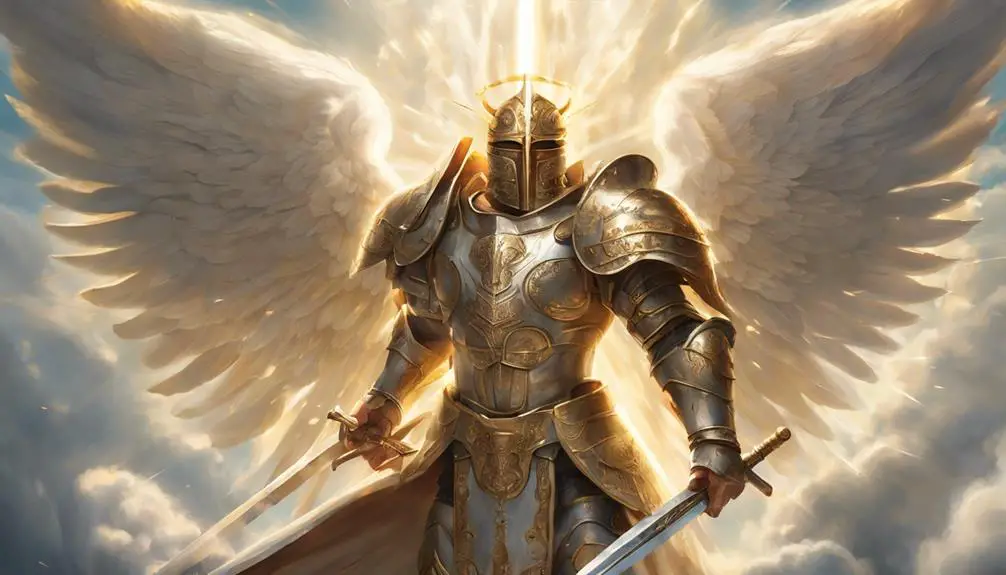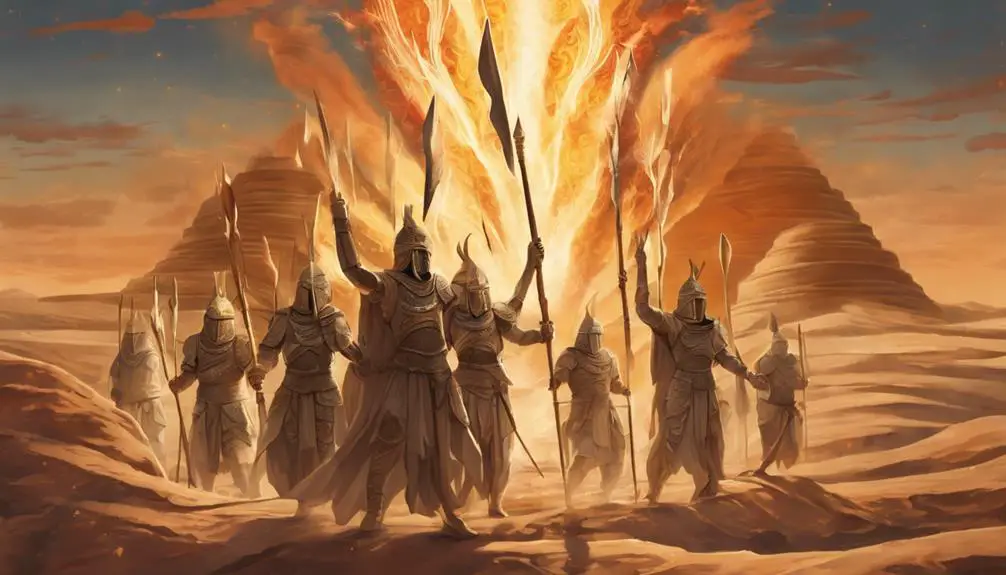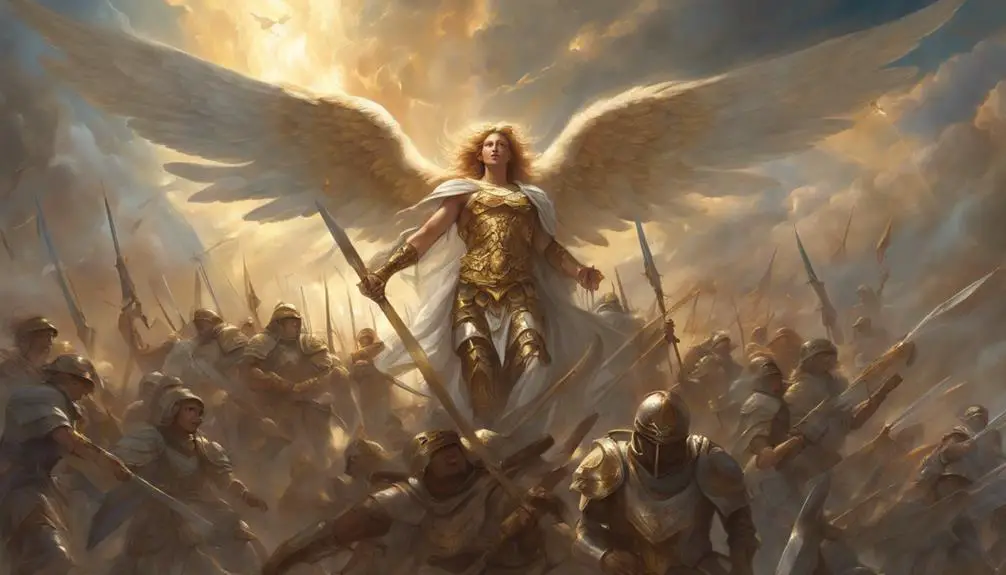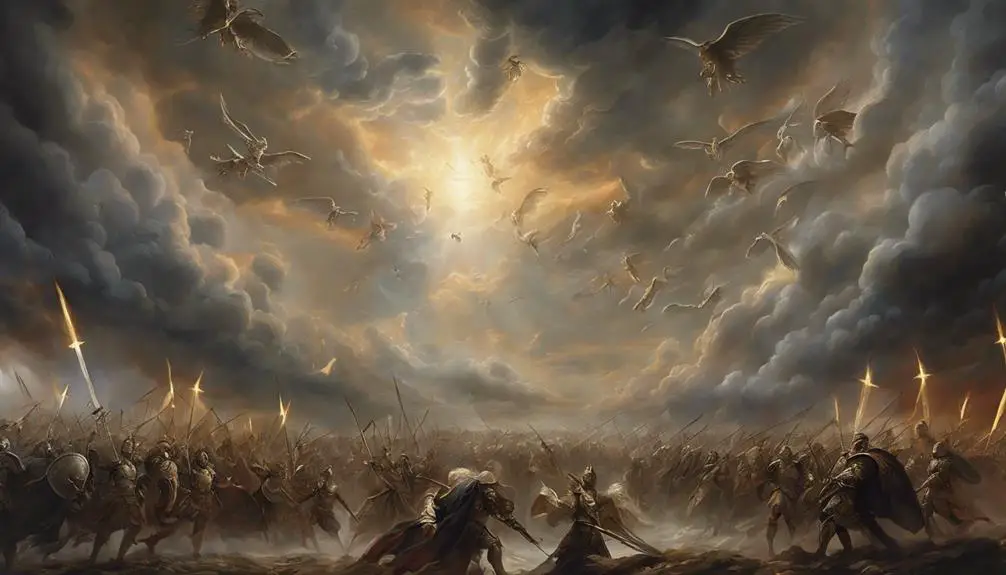Step into the realm of divine battles and angelic warriors with the Bible's Army of God, where faith and history intertwine mysteriously.

Army of God in the Bible
In the tapestry of biblical narratives, the Army of God stands as a beacon of divine intervention, its threads woven through stories of triumph and salvation.
You'll find its origins not just in the clashing of swords but in the quieter moments of angelic guidance and prophetic visions.
From the walls of Jericho to the battlefields of spiritual warfare in modern times, this celestial legion has been both protector and harbinger.
As you explore its composition, from angelic hosts to human heroes, you're left pondering how these ancient narratives echo in today's quests for faith and righteousness.
What lessons, you might wonder, does this divine army hold for us now?
Key Takeaways
- The Army of God symbolizes divine power and intervention in human affairs.
- Angelic hosts serve as messengers and executors of God's will.
- Key biblical victories demonstrate the importance of faith and divine guidance.
- Spiritual warfare requires believers to engage in prayer and develop resilience.
Origins and Early Mentions

Delving into the origins and early mentions of the Army of God, it's crucial to recognize its initial appearance in the biblical narrative, which sets a foundational context for its theological and historical significance. This term isn't merely a collection of words but a rich tapestry woven with theological symbolism and cultural interpretations that have evolved over centuries.
In the Old Testament, the Army of God is depicted as a formidable force, embodying divine power and authority. This portrayal isn't just about martial might but also serves as a profound representation of God's ability to protect and fight for His people. The concept transcends physical warfare, embedding itself deeply in the spiritual realm, where battles aren't fought with swords but with faith and devotion.
The cultural interpretations of the Army of God have varied significantly across different eras and societies. Initially, it might've been understood literally, as ancient peoples were no strangers to warfare and conflict. However, as theological understanding deepened, the symbolism of the Army of God began to reflect broader themes of moral and spiritual struggle.
Analyzing these early mentions, you'll find that the Army of God is more than a historical footnote. It's a pivotal concept that bridges divine intervention with human history, embodying themes of protection, righteousness, and ultimately, divine victory.
Angelic Hosts and Divine Messengers
Within the biblical narrative, angelic hosts and divine messengers play a pivotal role as the embodiment of the Army of God, serving both as protectors and heralds of divine will. These celestial beings aren't merely background characters; they're integral to the unfolding of God's plan across the scriptures. Their presence underscores the multifaceted nature of divine intervention, through both direct action and the conveyance of God's messages to humanity.
The angelic hierarchy and messenger roles are complex, yet they reveal the organized and purposeful nature of the divine army. Here are key aspects to consider:
- Angelic Hierarchy: There's a structured order among the angelic hosts, with archangels and cherubim playing prominent roles in executing God's commands.
- Messenger Roles: Angels are often dispatched to deliver critical information, warnings, or guidance to key figures in biblical narratives.
- Protectors of the Faithful: Beyond messaging, these beings also provide protection and guidance to individuals and nations aligned with divine will.
- Agents of Judgment: In several instances, angels act as executors of God's judgment, demonstrating the severity of divine law.
Understanding these roles and hierarchies not only enriches one's comprehension of biblical stories but also highlights the depth of the relationship between the divine and humanity.
Key Battles and Victories

Exploring the key battles and victories in the Bible reveals how the Army of God not only communicates divine will but actively enforces it, embodying God's power and justice through direct intervention in human affairs. These narratives offer insight into divine strategies and the ultimate defeat of enemy nations, showcasing God's sovereignty over all earthly powers.
The Bible details various battle strategies employed by the Army of God, often diverging from conventional human tactics. For instance, the walls of Jericho fell without a physical assault, illustrating a strategy that relied on faith and divine intervention rather than military might. Similarly, Gideon's victory over the Midianites with just 300 men underscores a reliance on strategic positioning and psychological warfare, highlighting how God's plans transcend human logic.
These accounts serve as reminders of the futility in opposing God's will, as enemy nations, regardless of their power or numbers, are consistently defeated. Such narratives underscore the omnipotence of God and the instrumental role of divine intervention in achieving victory. Through these stories, believers are encouraged to place their trust in God's plans, recognizing that victory doesn't always require overwhelming force but often divine guidance and faith.
Prominent Leaders and Heroes
Why do certain figures stand out as prominent leaders and heroes within the Army of God, shaping the course of biblical history through their faith and actions? These individuals navigated complex moral dilemmas and exhibited distinctive leadership styles that set them apart. Their stories, filled with courage and faith, continue to inspire and instruct.
- Moses: Known for his humility and direct communication with God, Moses faced significant moral dilemmas, including challenging Pharaoh's authority and leading the Israelites out of Egypt. His leadership style was characterized by patience and perseverance.
- Joshua: As Moses' successor, Joshua demonstrated a bold, decisive leadership style. He led the Israelites into the Promised Land, facing formidable enemies but always relying on God's guidance.
- Deborah: A prophetess and a judge, Deborah's leadership was marked by wisdom and courage. She inspired the Israelites to a significant victory against the Canaanites, showcasing the power of faith-driven leadership.
- David: Before becoming king, David was a shepherd boy who defeated Goliath. His trust in God, combined with his strategic thinking and bravery, exemplified a leadership style that balanced faith with practical action.
These leaders' unique approaches to guiding the Army of God through trials and triumphs underscore the diversity of effective leadership and the importance of faith in overcoming challenges.
Spiritual Warfare and Modern Implications

How does spiritual warfare manifest in modern contexts, and what implications does it hold for contemporary believers?
In today's rapidly evolving society, spiritual warfare takes on various forms, challenging believers to adapt and strengthen their faith resilience. You're confronted with a barrage of societal pressures, ethical dilemmas, and moral ambiguities that test your faith on a daily basis. It's within these challenges that the concept of spiritual warfare becomes incredibly relevant.
To navigate this landscape, you must develop robust prayer strategies. These aren't mere recitations but deeply personal conversations with God that seek guidance, strength, and wisdom to face modern-day battles. Prayer becomes your shield, fortifying your spirit against the onslaught of secular influences and temptations that vie for your attention and allegiance.
Moreover, your faith resilience is crucial in maintaining a steadfast commitment to your beliefs amidst adversity. This resilience is cultivated through consistent spiritual disciplines, including prayer, meditation on the Scriptures, and fellowship with like-minded believers. Together, these practices equip you to discern and withstand the subtle nuances of spiritual warfare in the modern age, ensuring that your faith not only survives but thrives.
Frequently Asked Questions
How Do Different Religious Denominations Interpret the Concept of the 'Army of God' in the Bible?
You'll find that interpretations of divine commands and the concept of spiritual warfare vary widely among different religious denominations. Some view it metaphorically, emphasizing personal struggles against sin. Others take a more literal approach, seeing it as a call to spread their faith or defend it against perceived threats.
Each perspective shapes how followers engage with their spirituality, influencing everything from daily prayers to community actions. It's a complex, nuanced topic with deep roots in faith traditions.
Are There Any Archaeological Findings or Historical Evidences That Corroborate the Events Related to the 'Army of God' Mentioned in the Bible?
You're looking into whether any archaeological findings support certain historical events, aren't you?
It's vital to question the authenticity of artifacts and be aware of expedition controversies.
Careful analysis reveals that, while some discoveries are claimed to corroborate these events, the evidence often remains subject to debate among scholars.
The objective, detailed examination of such findings is crucial, as the line between historical facts and interpretations can sometimes be blurred.
How Has the Portrayal of the 'Army of God' in Popular Culture, Such as Movies, Literature, and Art, Influenced Contemporary Understanding and Perceptions of These Biblical Narratives?
In popular culture, cinematic influence and artistic interpretations of biblical narratives have deeply shaped your understanding of these stories. Movies, literature, and art have reimagined these tales, often highlighting drama and moral lessons.
This portrayal can blur historical accuracy with creative license, affecting how you perceive these ancient stories. The visual and emotional impact of these mediums ensures that their interpretation of events remains vivid in contemporary collective memory.
In What Ways Do Theological Perspectives on the 'Army of God' Inform Ethical and Moral Considerations in Modern-Day Conflicts and Warfare?
You're navigating a minefield where divine warfare informs every step. Theological perspectives on ethical implications in modern-day conflicts dive deep into moral quandaries. They push you to ponder: How does belief in a spiritual battle influence decisions on the battlefield?
This analytical journey uncovers that religious convictions shape warriors' ethics, guiding actions as if directed by an unseen hand. It's a complex interplay of faith, morality, and earthly warfare, challenging you to dissect the invisible layers of conflict.
Can Parallels Be Drawn Between the 'Army of God' as Described in the Bible and Similar Concepts Found in Other Religious Texts or Mythologies Around the World?
Certainly, you can find parallels between divine warriors in various religious texts and mythologies around the world. These figures often embody the values and ethical codes of their respective cultures.
When analyzing these mythological parallels, it's crucial to consider how they reflect societal attitudes towards conflict and warfare. Such comparisons reveal a universal concept of divine intervention in human affairs, underscoring the deep-rooted human desire for guidance and protection from a higher power.
Conclusion
So, after diving deep into the biblical concept of the Army of God, you've seen its origins, its celestial squadrons, and its notable skirmishes.
You've met the heavy hitters and contemplated the eternal struggle between good and evil. Ironically, while it seems like a divine draft from ancient texts, the principles of spiritual warfare are anything but outdated.
In fact, they're arguably more relevant today. It's a cosmic conflict, yet here we are, analyzing it as if it were a mere historical footnote.



Sign up